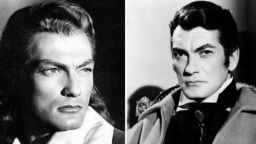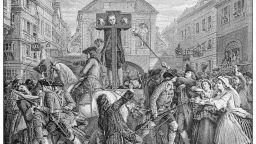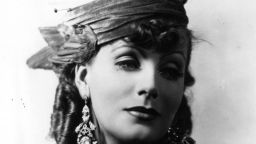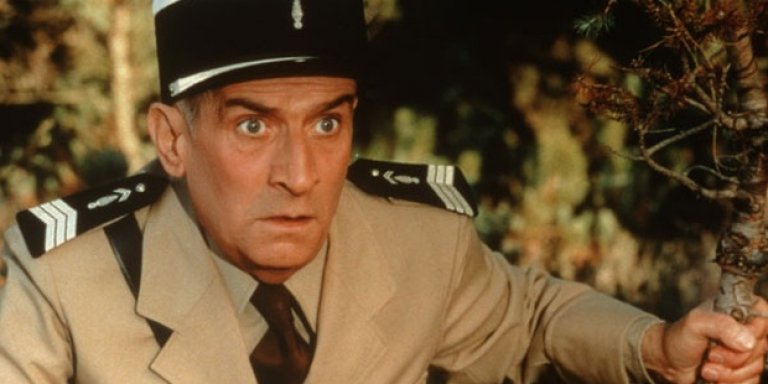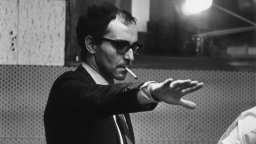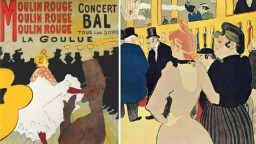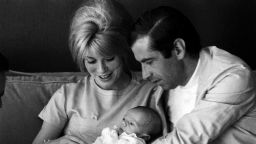Very often, as viewers, we judge actors by what we see on screen. We create an image that does not always match the real personality of the actor. And most often this happens with comedians. According to an unofficial statistic, paradoxically but a fact – most of them were sad people in ordinary life.
One of our funniest screen favorites – the comedian Louis de Funes – is also described as a sad and lonely person. It’s hard for us to believe it, but according to the actor’s biographers, he felt dissatisfied almost all his life. He found solace in inner loneliness with his second wife, Guy de Maupassant’s niece – Jeanne Barthélemy, and he himself admits that it was only with her that he understood the importance of having a family, but nevertheless he continued to be sad, grumpy and miserly.

In a frame from the movie “The Big Vacation” with his son Olivier
It must be hard to believe because who hasn’t laughed their heads off at Louis de Funes roles? – We remember him as Inspector Cruchet /”The Policeman from Saint-Tropez”/, in “The Frozen One”, “The Big Vacation”, “The Big Restaurant”, “Heard Us, He Saw Us”, “A Wing or a Sparrow”, “Perched on a Tree “, “The Man Orchestra” and many others. etc. He acted in 152 films, he was the screenwriter of 6 of them, and he was the director of one, and this film is called “The Miser”. Is it not a coincidence? – One critic wrote after the actor’s death that Louis de Funes “directed himself” in this film. Yes, he was thrifty because he had a difficult childhood – he wanted to teach his children to value hard-earned money.
According to psychoanalysts, we should always look for the roots of human characters in childhood. Born into a family of impoverished Spanish aristocrats in France, little Louis carried along with his long Spanish name a rather “short” clarity about what he could and could not afford. Naturally, the restrictions were more than the permitted things. His father was a lawyer, but he did not earn well. Louis de Funes must have had this poverty complex from a young age, which made him a bit angry to preserve his ego.
In an infantile way, he found ways to “shine” with his aristocratic origin. He was a weak student, but instead of shrinking because of it, he took revenge on the teachers by making fun of them. He imitated them mockingly and everyone laughed at his grimaces.

With his screen partner Claude Jeansac, who died at the age of 89
Before the heart attack took his life, Louis de Funes told his wife that he would be very lonely without her… He died on January 27, 1983 in Nantes. Exactly 40 years ago.
A little biographical information about young Louie. His father Carlos was forced to leave the legal profession and started a diamond business. But he went bankrupt again. According to some of Louis de Funes’ biographers, Carlos de Funes had staged suicide to escape his family all the way to Venezuela. Louis experienced this “betrayal” hard. His mother is left with three children and an apartment in the center of Paris, which, however, she cannot afford. Her constant worries made her so nervous that she started yelling at her children all the time.
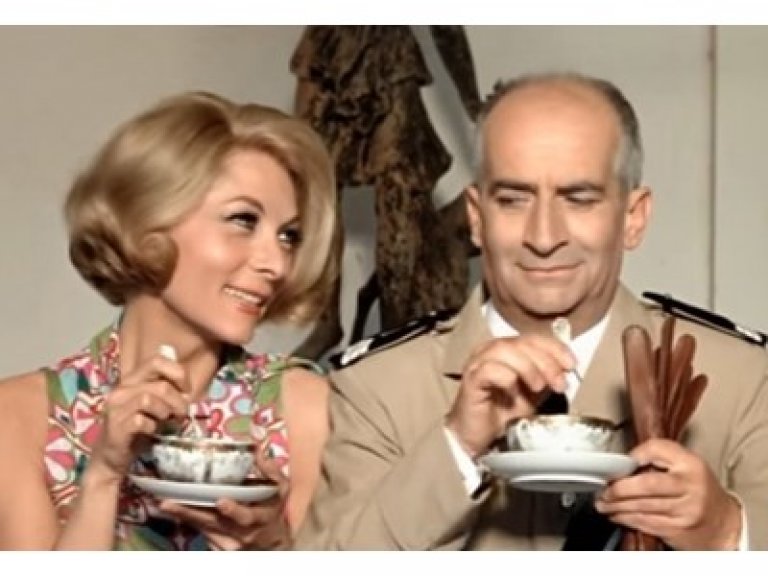
With his screen partner Claude Jeansac, who died at the age of 89
Louie didn’t do well in school, but he took piano lessons. During the Hitler occupation of Paris in 1940, he started working as a pianist in a night bar. At that time he was already married to his first wife, Germaine Louise Elodie Carrois, and they had a son. In the same year, the actor’s older brother died at the front. Louie was looking for an outlet for all the bad things that were accumulating in his life and started taking theater lessons. It was his escape from reality. In 1942 he divorced his wife and she made him agree not to see their son Daniel anymore. Louis agreed, but did not keep this promise.
The following year, he married for the second time – to Jeanne. From his marriage with her, he has two sons – Patrick, who became a doctor, and Olivier – briefly an actor, and then an aviator. In the end, none of his sons inherited the acting profession.
Louis de Funes himself worked whatever, until he was noticed – he was an accountant, a furrier, a shoe cleaner, a shopkeeper… And everywhere he created such trouble that he was kicked out. While working in a photo studio, he almost caused a fire. At the next workplace – a fashion salon for hats, he threw a glass of water in the manager’s face during an argument between the two. Rumors about his unfriendly character also spread to the theater, where he began working first as a set worker.
You will be surprised, but the first roles of Louis de Funes were romantic characters. He debuted in the cinema in 1946 in the film “The Temptation of Barbizon”.

At the beginning of his career, he was offered romantic roles
A period of cameos in 75 films followed, hoping to get noticed, but that never happened. Until the comedy “Heard us, saw us”, when “Frances Dimanches” proclaimed him “the funniest actor in France”. Quote: ” … he is neither young, nor romantic, nor handsome, nor has hair… But his wife has not yet divorced him, on the contrary – she is always present on the set. It seems that Monsieur Funes cannot to film without her.”
This is the first “review” of the great comedian – slightly comical, but nevertheless – laudatory.

Only 164 centimeters tall, de Funes liked to poke fun at himself
In the 60s of the 20th century, de Funes starred in the famous trilogy “Fantomas” by André Junbel, in “The Great Walk” and “The Fool” by Gerard Ury. In the last two, he acted together with Bourville, and the films were declared the highest-grossing films of French cinema of that period. Louis de Funes is finally recognized and rich.
His wife Jeanne turns out to be the heiress to part of the Clermont castle in Les Celliers, not far from Nantes, and after the film “The Great Walk” Louis de Funes has the opportunity to buy the entire castle with the money from the film. In his mansion, the actor began to grow roses, and this became his favorite hobby.

In a shot from the Fantomas series
In 1964, Louis de Funes starred in “The Policeman of Saint-Tropez”, which marked the beginning of a series of films with the policeman Cruchet and his brigade, which lasted almost twenty years – from 1964 to 1982.
During this time, the actor starred in dozens more films: “Oscar” (1967), “The Big Vacation” (1968), “The Orchestra Man” (1970), “The Policeman Retires” (1970), “The Madness of the Great” (1972). , “The Adventures of Rabbi Jacob” (1973), “The Miser” (1980), “Cabbage Soup” (1981) and others.
Here, however, we have to place a “watershed” in the actor’s life after the date of March 15, 1973, when Louis de Funes was awarded the title of Knight of the Legion of Honor.
With this high honor, unfortunately, a dark period in his life begins. De Funes practically stopped filming because he became seriously ill. In March 1975, he had a heart attack and barely survived.
It stops working and its fame seems almost extinguished when something fateful happens.

The master of grimaces, Louis de Funes
But, let’s start from a publication in which it is written: “Just when Louis finally decided to abandon the cinema, sell his house in Paris, go forever to his mansion in Nantes and grow flowers and write memoirs, Claude Zidi invited the actor for participation in “Wing or ball”.
Fate gave the actor a second chance, but for the already mentioned health reasons, he initially refused the role. And then he suddenly gathers courage, returns to Paris and begins work on the film that will make him world famous. In the pictures, he works under medical supervision and avoids noise and excitement.
Louis de Funes did not like to drive, often went fishing and grew roses on the estate. Thus he relieved the tension and “protected others from his bad character”. The actor is also the author of the scripts of many films: “Cabbage Soup” (1981), “Frozen” (1969), “Oscar” (1967) and “The Big Restaurant” (1967). And, as already mentioned – and director of “The Miser”, for which he won the “Cesar” award in 1979, for his role as the miser Arpagon.
https://www.youtube.com/watch?v=2k4KeQJraaE
Shortly after the filming of “The Policeman and the Policewomen” was completed, on January 27, 1983, Louis de Funes died at his home in Nantes of a heart attack. He was buried in the town of Le Cellier, neighboring Nantes. His wife Jeanne died on March 7, 2015 at the age of 101 and was buried next to her beloved husband.
It is curious what she herself tells about Louis. Before his death, he did not talk about his roles, but about the fact that his sons “turned out donkeys” – he was harassed that no one wanted to inherit his profession. He set an example with himself – that from an early age he dreamed of becoming an actor and did everything to achieve it.
He also told his sons this, but as we have already said, one became a doctor and the other an aviator. He saw his firstborn son Daniel secretly. This was also a heartache for the actor.
The career of Louis de Funes began when he was already 31, but he quickly “caught up” and remained in the history of cinema as one of the greatest film comedians.
“I absolutely do not regret that my acting career developed so slowly. It was this slowness that helped me fully understand my profession. When I was unknown, I tried to draw small roles with details, gestures, facial expressions. I have a comic baggage that I helped make a career. And if I had to start a career again, I would repeat the chosen path again,” says the actor in an interview.
Well, there is no second Louis de Funes – so characteristic and fascinating; with a single grimace causing uproarious laughter to tears. Today we are left with his films – memorable and loved forever.
Emmy MARIANSKA

